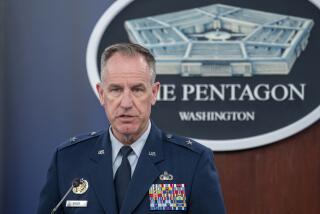Russia’s Use of Gas Focuses Attention on Chemical Agents in U.S.
- Share via
WASHINGTON — Russia’s use of an unspecified gas to end a Moscow hostage crisis last weekend is drawing new focus to claims that the United States is also developing chemical agents that would be illegal if used in warfare.
Bush administration officials said Monday that they suspect the gas used by Russian authorities was an opiate rather than a nerve gas, the most lethal and feared agent of chemical warfare. They said they based their view on interviews with victims conducted by nongovernmental organizations and by other nations responding to the scene.
Controversy continued Monday as Russian officials persisted in their refusal to identify the gas, which is believed to have caused most of the 117 or more hostage deaths during the crisis. They said only that it was a general anesthetic, such as one used in surgery.
Bush administration officials voiced displeasure with the Russians’ refusal to disclose the agent. “There is a lot of exasperation at the Russians’ attitude and approach to this so far,” a senior administration official said on condition of anonymity.
Arms control experts said Russia’s use of the gas, regardless of its type, threatened to widen a “loophole” in a 5-year-old treaty designed to eliminate chemical warfare agents.
The treaty, the Chemical Weapons Convention, bans the development, production and stockpiling of any chemical weapon for warfare -- even such common chemicals as tear gas.
However, it allows the use of certain chemical agents for “law enforcement, including domestic riot control purposes.”
The fear, arms control experts said, is that Russia and other nations are developing chemical agents for warfare under the cover of using them for law enforcement.
Moreover, they said, the Russian action raises questions about when chemical agents may be used on civilians. The experts are divided on whether the Moscow hostage standoff, which involved armed rebels in an ongoing military conflict, was a matter of law enforcement or warfare.
Other uses of military force, such as peacekeeping missions, rescue operations and aspects of the Bush administration’s war on terrorism, may also fall into the gray area between police actions and warfare, arms control specialists said.
“It used to be that war was war, and now there is a whole gradation of military activities that need to be taken into account,” said Elisa Harris, a member of the White House National Security Council during the Clinton administration. She said nations that signed the chemical weapons treaty may have to clarify what constitutes warfare at their next meeting, in 2003. The U.S. and Russia were among the original signatories in 1993.
Russia apparently is not the only nation to develop so-called nonlethal chemical agents. Some critics say the United States and possibly other countries are developing chemical agents for domestic and peacekeeping use that would be illegal in a full-scale war.
“The Pentagon is actively assessing different types of calmative compounds,” or narcotic materials meant to incapacitate rather than kill, said Edward Hammond of the Sunshine Project, a nonprofit group that opposes the use of chemical weapons. The group is based in Austin, Texas, and Hamburg, Germany.
In August, Science magazine reported that the National Institute of Justice, the research arm of the Department of Justice, had funded an experiment at Pennsylvania State University to gauge the effects of inhaled calmative gases and pepper spray, a crowd-control agent. The report said the research could lead to “weaponized” Valium and other chemicals for use in crowd control.
The Sunshine Project has posted a contract on its Web site, www.sunshine-project.org, in which the Office of Naval Research agreed to pay Penn State $88,750 to study the “utility of delivering nonlethal effects against personnel.”
Defense officials acknowledge that the Pentagon has developed “riot control agents,” such as tear gas and pepper spray, that have been used in Haiti and Bosnia-Herzegovina.
The Pentagon office responsible for such weapons, the Joint Non-Lethal Weapons Directorate, has received “unsolicited proposals” for so-called calming agents, “but no funding has been put forward to support any of that research,” a defense official said.
“Calming agents are not in the U.S. inventory, nor are there any plans to develop any,” said Bryan Whitman, a senior Pentagon spokesman.
Arms control specialists said the alleged U.S. research, combined with Russia’s use of gas last weekend, signals that some provisions of the Chemical Weapons Convention may be deteriorating.
More to Read
Sign up for Essential California
The most important California stories and recommendations in your inbox every morning.
You may occasionally receive promotional content from the Los Angeles Times.













